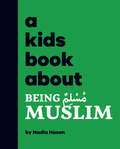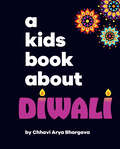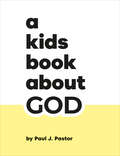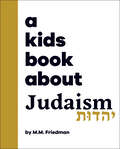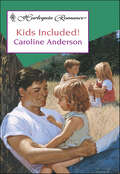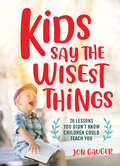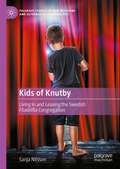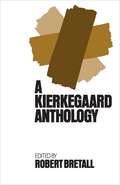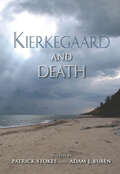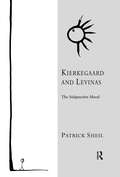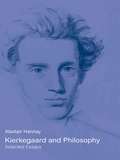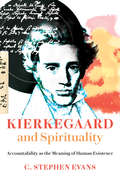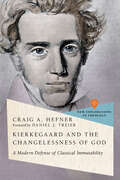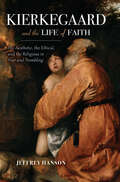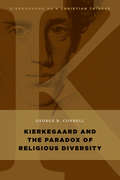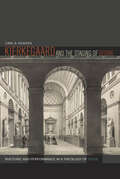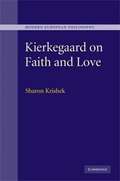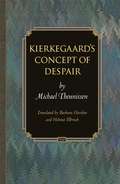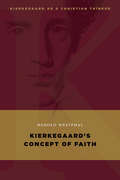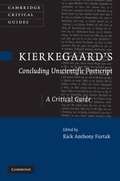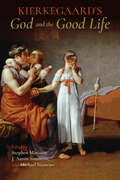- Table View
- List View
Kids Book About Being Muslim, A (A Kids Book)
by Nadia HasanThe challenges, joy, and beauty in being Muslim American.Salaam! Or, peace be upon you. What does it mean to be Muslim American? Open this book to begin your journey. This author speaks from her personal experience and shares aspects of how she worships, the customs and traditions she follows, which are also universal to so many Muslim Americans. And, you'll learn beautiful new words along the way! Most importantly, grow in your understanding of this community!
Kids Book About Diwali, A (A Kids Book)
by Chhavi Arya BhargavaLearn more about Diwali, how it's celebrated, and how you can participate in the festivities!This book is all about Diwali, the festival of lights! Celebrated for 5 days every year in the fall, this holiday commemorates The Ramayana, a story which highlights the triumph of good over evil and light over darkness. Learn more about this beautiful celebration and how you can participate. Diwali is celebrated all over the world, and it's for everyone.
Kids Book About God, A (A Kids Book)
by Paul J. PastorThis book helps to ask questions about God no matter what you believe.Who is God? Where do I go when I die? Is God even real? This book answers none of these questions, but it asks them all! It is a thoughtful book that enforces no views but stresses the importance of a healthy dialogue, curiosity, love, and wonder.
Kids Book About Judaism, A (A Kids Book)
by M.M. FriedmanLearn about Orthodox Jewish traditions, celebrations, and joy.What do you know about Judaism? How about Orthodox Judaism? Whether it's a lot or a little, this is the book for you! Read about this author's experience growing up in an Orthodox Jewish community and how he and his community celebrate, believe, and worship. These traditions have been passed down for thousands of years and connect this worldwide community!
Kids Included!
by Caroline AndersonWhen Jack met Molly again on vacation with their respective children in tow, it brought home two things-the fun and fiasco of their last meeting and just how much they wanted each other!Their holiday certainly brought them closer. But what woman would want to take Jack on with four children-especially when she already had two of her own?But those children realized something their parents didn't-that five plus three equals the ideal family!
Kids Say the Wisest Things: 26 Lessons You Didn't Know Children Could Teach You
by Jon GaugerFunny stories. Make-you-cry stories. And all of them show us something about ourselves and our Savior we can never forget.-Dr. Tony Evans, President, The Urban Alternative, Senior Pastor, Oak Cliff Bible FellowshipKids have a way of saying things adults would never say and revealing profound—even biblical—truths in their unfiltered, unedited commentary on the world. In this inspiring book, Jon Guager shares important lessons he learned about God by observing kids. Like the story of Joslynn&’s tumble. When Joslynn was camping she falls down the camper&’s stairs to the horror of her watching grandparents. But when she stands up and declares, "Let&’s try that again," Jon Gauger (Grandpa) notices how even though Joslynn had failed at something, she was kissed, hugged, and comforted by her family. Gauger reminds us that this is how God responds to us when we seemed to have failed "big time."Each anecdote teaches the Christian a familiar truth through a less familiar vehicle, making this giftable book fresh and fun.
Kids Say the Wisest Things: 26 Lessons You Didn't Know Children Could Teach You
by Jon GaugerFunny stories. Make-you-cry stories. And all of them show us something about ourselves and our Savior we can never forget.-Dr. Tony Evans, President, The Urban Alternative, Senior Pastor, Oak Cliff Bible FellowshipKids have a way of saying things adults would never say and revealing profound—even biblical—truths in their unfiltered, unedited commentary on the world. In this inspiring book, Jon Guager shares important lessons he learned about God by observing kids. Like the story of Joslynn&’s tumble. When Joslynn was camping she falls down the camper&’s stairs to the horror of her watching grandparents. But when she stands up and declares, "Let&’s try that again," Jon Gauger (Grandpa) notices how even though Joslynn had failed at something, she was kissed, hugged, and comforted by her family. Gauger reminds us that this is how God responds to us when we seemed to have failed "big time."Each anecdote teaches the Christian a familiar truth through a less familiar vehicle, making this giftable book fresh and fun.
Kids of Knutby: Living in and Leaving the Swedish Filadelfia Congregation (Palgrave Studies in New Religions and Alternative Spiritualities)
by Sanja NilssonThis book tells the story of the children and youth of the charismatic new religious commune Knutby Filadelfia in Sweden. It recounts the history of the congregation, which started out as a part of the Swedish Pentecostalmovement in 1921. In the 1990s, it developed into a new religion, when the congregation’s female pastor embraced the role of the Bride of Christ. The congregation became widely known in 2004 when one of its members was murdered by another member, the latter claiming to have been acting on orders from God. In 2018, the congregation dissolved after a few years of internal crisis.Sanja Nilsson provides rich empirical analysis of archival material and interviews with the congregation’s children and youth. The young informants’ personal perspectives on their own childhoods encompass narratives from their time inside the congregation, when they identified as members of a stigmatizedminority religion, as well as from the time after the dissolution of the group, when they identified asdefectors from what they came to view as a sectarian milieu.This work offers a comprehensive insight into the Knutby Filadelfia congregation, a group, that although notoriously charted by the media, has been hitherto unexplored by academics. It adds to the growing field of studies concerned with childhoods within new religions and expounds the dynamics of the defection process from the rarely applied perspective of children and youth themselves.
Kierkegaard Anthology
by Robert BretallThis anthology covers the whole of Kierkegaard's literary career. The selections range from the terse epigrams of the Journal through the famous "Diary of the Seducer" and the "Banquet" scene, in which Søren Kierkegaard reveals his great lyric and dramatic gifts, on to the philosophical and psychological works of his maturity. These are climaxed by the beautiful and moving religious discourses which accompany them; finally, there is the biting satire of his Attack upon "Christendom."This is emphatically not a collection of "snippets," but the cream of Kierkegaard, each selection interesting and intelligible in itself, and all ranking among his most important work. They are so arranged as to convey an idea of his remarkable intellectual development.Contents: A comprehensive anthology from the following works: Either/Or Fear and Trembling Stages on Life's Way Works of Love Concluding Unscientific Postscript Attack upon "Christendom" The Sickness Unto Death Philosophical Fragments and other?
Kierkegaard and Death
by Patrick Stokes andssss Adam J. Buben“This impressive [anthology] succeeds admirably at demonstrating how the Kierkegaardian corpus presents . . . a philosophy of finite existence” (Notre Dame Philosophical Reviews).Few philosophers have devoted such sustained, almost obsessive attention to the topic of death as Søren Kierkegaard. Kierkegaard and Death brings together new work on Kierkegaard’s multifaceted discussions of death and provides a thorough guide to the development, in various texts and contexts, of Kierkegaard’s ideas concerning death.Essays by an international group of scholars take up essential topics such as dying to the world, living death, immortality, suicide, mortality and subjectivity, death and the meaning of life, remembrance of the dead, and the question of the afterlife. While bringing Kierkegaard’s philosophy of death into focus, this volume connects Kierkegaard with important debates in contemporary philosophy.
Kierkegaard and Levinas: The Subjunctive Mood (Transcending Boundaries in Philosophy and Theology)
by Patrick SheilThe Danish Christian existentialist Søren Kierkegaard (1813-1855) and the Jewish Lithuanian-born French interpreter of modern phenomenology Emmanuel Levinas (1906-1995) have enabled theology and philosophy to illuminate and confront one another in radical and important ways. This book addresses the theological and philosophical thought of both Kierkegaard and Levinas with a focus on the special form that exists in the grammar of many languages for cases of uncertainty, possibility, hypothesis and for expressions of hope: the subjunctive mood. As well as presenting arguments and observations about Kierkegaard and Levinas through an analysis of the subjunctive mood, Patrick Sheil offers an interesting and accessible way into the thought of these two major European philosophers and he explores a wide range of Kierkegaardian and Levinasian texts throughout.
Kierkegaard and Philosophy: Selected Essays
by Alastair HannayKierkegaard and Philosophy makes many of the most important papers on Kierkegaard available in one place for the first time. These seventeen essays, written over a period of over twenty years, have all been substantially revised or specially prepared for this collection, with a new introduction by the author.In the first part, Alastair Hannay concentrates on Kierkegaard's central philosophical writings, offering closely text-based accounts of the silent concepts Kierkegaard uses. The second part shows the relevance of other thinkers' treatments of shared themes, pointing out where they differ from Kierkegaard. The concluding chapter provides a reason Kierkegaard himself would give for disagreeing with those who claim his texts are infinitely interpretable.Written by the world's foremost Kierkegaard scholar and translator, Kierkegaard and Philosophy is an indispensible resource for all students of Kierkegaard's work.
Kierkegaard and Spirituality: Accountability as the Meaning of Human Existence (Kierkegaard as a Christian Thinker)
by C. Stephen EvansWe live spiritually when we live in the presence of God.The Danish philosopher Søren Kierkegaard is often read for his contributions to Christian theology, but he also has much to offer about spirituality—both Christian and more generally human. C. Stephen Evans assesses Kierkegaard&’s belief that true spirituality should be seen as accountability: the grateful recognition of our existence as gift. Spirituality takes on a Christian flavor when one recognizes in Jesus Christ the human incarnation of the God who gives us being. In this clearly written and substantive book a leading scholar on Kierkegaard&’s thought makes Kierkegaard&’s contributions to spirituality accessible not only to philosophers and theologians but to pastors, spiritual directors, and lay Christians. The Kierkegaard and Christian Thought series, coedited by C. Stephen Evans and Paul Martens, aims to promote an enriched understanding of nineteenth-century philosopher-theologian Søren Kierkegaard in relation to other key figures in theology and key theological concepts.
Kierkegaard and the Changelessness of God: A Modern Defense of Classical Immutability (New Explorations in Theology)
by Craig A. HefnerDanish theologian and philosopher Søren Kierkegaard was not afraid to express his opinions. Living amid what he perceived to be a culturally lukewarm Christianity, he was often critical of his contemporary church. But that does not mean Kierkegaard rejected traditional Christian theology. Indeed, at a time when many of his contemporaries were questioning the classical doctrine of God, Kierkegaard swam against the stream by maintaining orthodox Christian beliefs. In this volume in IVP Academic's New Explorations in Theology series, Craig A. Hefner explores Kierkegaard's reading of Scripture and his theology to argue not only that the great Dane was a modern defender of the doctrine of divine immutability (or God's changelessness) in response to the disintegration of the self, but that his theology can be a surprising resource today. Even as the church continues to be beset by "shifting shadows" (James 1:17), Kierkegaard can remind us of the good and perfect gifts that come from an unchanging God.
Kierkegaard and the Life of Faith: The Aesthetic, the Ethical, and the Religious in Fear and Trembling
by Jeffrey Hanson“A thorough, considered, and provocative treatment of what justifiably remains Kierkegaard’s most famous book.” —Marginalia Review of BooksSoren Kierkegaard’s masterful work Fear and Trembling interrogates the story of Abraham and Isaac, finding there one of the most profound and critical dilemmas in all of religious philosophy. While several commentaries and critical editions exist, Jeffrey Hanson offers a distinctive approach to this crucial text.Hanson gives equal weight to all three of Kierkegaard’s “problems,” dealing with Fear and Trembling as part of the entire corpus of Kierkegaard’s thought and putting all parts into relation with each other. Additionally, he offers a distinctive analysis of the Abraham story and other biblical texts, giving particular attention to questions of poetics, language, and philosophy, especially as each relates to the aesthetic, the ethical, and the religious.Presented in a thoughtful and fresh manner, Hanson’s claims are original and edifying. This new reading of Kierkegaard will stimulate fruitful dialogue on well-traveled philosophical ground.
Kierkegaard and the Paradox of Religious Diversity (Kierkegaard as a Christian Thinker)
by George B. ConnellSøren Kierkegaard (1813–1855) famously critiqued Christendom — especially the religious monoculture of his native Denmark. But what would he make of the dizzying diversity of religious life today? In this book George Connell uses Kierkegaard’s thought to explore pressing questions that contemporary religious diversity poses. Connell unpacks an underlying tension in Kierkegaard, revealing both universalistic and particularistic tendencies in his thought. Kierkegaard’s paradoxical vision of religious diversity, says Connell, allows for both respectful coexistence with people of different faiths and authentic commitment to one’s own faith. Though Kierkegaard lived and wrote in a context very different from ours, this nuanced study shows that his searching reflections on religious faith remain highly relevant in our world today.
Kierkegaard and the Paradox of Religious Diversity (Kierkegaard as a Christian Thinker)
by George B. ConnellSøren Kierkegaard (1813–1855) famously critiqued Christendom — especially the religious monoculture of his native Denmark. But what would he make of the dizzying diversity of religious life today? In this book George Connell uses Kierkegaard&’s thought to explore pressing questions that contemporary religious diversity poses. Connell unpacks an underlying tension in Kierkegaard, revealing both universalistic and particularistic tendencies in his thought. Kierkegaard&’s paradoxical vision of religious diversity, says Connell, allows for both respectful coexistence with people of different faiths and authentic commitment to one&’s own faith. Though Kierkegaard lived and wrote in a context very different from ours, this nuanced study shows that his searching reflections on religious faith remain highly relevant in our world today.
Kierkegaard and the Staging of Desire: Rhetoric and Performance in a Theology of Eros
by Carl S. HughesTheology in the modern era often assumes that the consummate form of theological discourse is objective prose—ignoring or condemning apophatic traditions and the spiritual eros that drives them. For too long, Kierkegaard has been read along these lines as a progenitor of twentieth-century neo-orthodoxy and a stern critic of the erotic in all its forms. In contrast, Hughes argues that Kierkegaard envisions faith fundamentally as a form of infinite, insatiable eros. He depicts the essential purpose of Kierkegaard’s writing as to elicit ever-greater spiritual desire, not to provide the satisfactions of doctrine or knowledge.Hughes’s argument revolves around close readings of provocative, disparate, and (in many cases) little-known Kierkegaardian texts. The thread connecting all of these texts is that they each conjure up some sort of performative “stage setting,” which they invite readers to enter. By analyzing the theological function of these texts, the book sheds new light on the role of the aesthetic in Kierkegaard’s authorship, his surprising affinity for liturgy and sacrament, and his overarching effort to conjoin eros for God with this-worldly love.
Kierkegaard and the Theology of the Nineteenth Century
by George PattisonThis study shows how Kierkegaard's mature theological writings reflect his engagement with the wide range of theological positions which he encountered as a student, including German and Danish Romanticism, Hegelianism and the writings of Fichte and Schleiermacher. George Pattison draws on both major and lesser-known works to show the complexity and nuances of Kierkegaard's theological position, which remained closer to Schleiermacher's affirmation of religion as a 'feeling of absolute dependence' than to the Barthian denial of any 'point of contact', with which he is often associated. Pattison also explores ways in which Kierkegaard's theological thought can be related to thinkers such as Heidegger and John Henry Newman, and its continuing relevance to present-day debates about secular faith. His volume will be of great interest to scholars and students of philosophy and theology.
Kierkegaard on Faith and Love
by Sharon KrishekKierkegaard's writings are interspersed with remarkable stories of love, commonly understood as a literary device that illustrates the problematic nature of aesthetic and ethical forms of life, and the contrasting desirability of the life of faith. Sharon Krishek argues that for Kierkegaard the connection between love and faith is far from being merely illustrative. Rather, love and faith have a common structure, and are involved with one another in a way that makes it impossible to love well without faith. Remarkably, this applies to romantic love no less than to neighbourly love. Krishek's original and compelling interpretation of the Works of Love in the light of Kierkegaard's famous analysis of the paradoxicality of faith in Fear and Trembling shows that preferential love, and in particular romantic love, plays a much more important and positive role in his thinking than has usually been assumed.
Kierkegaard's Concept of Despair (Princeton Monographs in Philosophy #49)
by Michael TheunissenThe literature on Kierkegaard is often content to paraphrase. By contrast, Michael Theunissen articulates one of Kierkegaard's central ideas, his theory of despair, in a detailed and comprehensible manner and confronts it with alternatives. Understanding what Kierkegaard wrote on despair is vital not only because it illuminates his thought as a whole, but because his account of despair in The Sickness unto Death is the cornerstone of existentialism. Theunissen's book, published in German in 1993, is widely regarded as the best treatment of the subject in any language. Kierkegaard's Concept of Despair is also one of the few works on Kierkegaard that bridge the gap between the Continental and analytic traditions in philosophy. Theunissen argues that for Kierkegaard, the fundamental characteristic of despair is the desire of the self "not to be what it is." He sorts through the apparently chaotic text of The Sickness unto Death to explain what Kierkegaard meant by the "self," how and why individuals want to flee their selves, and how he believed they could reconnect with their selves. According to Theunissen, Kierkegaard thought that individuals in despair seek to deny their authentic selves to flee particular aspects of their character, their past, or the world, or in order to deny their "mission." In addition to articulating and evaluating Kierkegaard's concept of despair, Theunissen relates Kierkegaard's ideas to those of Heidegger, Sartre, and other twentieth-century philosophers.
Kierkegaard's Concept of Faith (Kierkegaard as a Christian Thinker)
by Merold WestphalIn this book renowned philosopher Merold Westphal unpacks the writings of nineteenth-century thinker Søren Kierkegaard on biblical, Christian faith and its relation to reason.Across five books — Fear and Trembling, Philosophical Fragments, Concluding Unscientific Postscript, Sickness Unto Death, and Practice in Christianity — and three pseudonyms, Kierkegaard sought to articulate a biblical concept of faith by approaching it from a variety of perspectives in relation to one another. Westphal offers a careful textual reading of these major discussions to present an overarching analysis of Kierkegaard’s conception of the true meaning of biblical faith.Though Kierkegaard presents a complex picture of faith through his pseudonyms, Westphal argues that his perspective is a faithful and illuminating one, making claims that are important for philosophy of religion, for theology, and most of all for Christian life as it might be lived by faithful people.
Kierkegaard's Concluding Unscientific Postscript: A Critical Guide
by Rick Anthony FurtakSoren Kierkegaard's Concluding Unscientific Postscript has provoked a lively variety of divergent interpretations for a century and a half. It has been both celebrated and condemned as the chief inspiration for twentieth-century existential thought, as a subversive parody of philosophical argument, as a critique of mass society, as a forerunner of phenomenology and of postmodern relativism, and as an appeal for a renewal of religious commitment. These new essays written by international Kierkegaard scholars offer a plurality of critical approaches to this fundamental text of existential philosophy. They cover hotly debated topics such as the tension between the Socratic-philosophical and the Christian-religious; the identity and personality of Kierkegaard's pseudonym 'Johannes Climacus'; his conceptions of paradoxical faith and of passionate understanding; his relation to his contemporaries and to some of his more distant predecessors; and, last but not least, his pertinence to our present-day concerns.
Kierkegaard's Fear and Trembling
by Daniel ConwayWritten by an international team of contributors, this book offers a fresh set of interpretations of Fear and Trembling, which remains Kierkegaard's most influential and popular book. The chapters provide incisive accounts of the psychological and epistemological presuppositions of Fear and Trembling; of religious experience and the existential dimension of faith; of Kierkegaard's understanding of the relationship between faith and knowledge; of the purported and real conflicts between ethics and religion; of Kierkegaard's interpretation of the value of hope, trust, love and other virtues; of Kierkegaard's debts to German idealism and Protestant theology; and of his seminal contributions to the fields of psychology, existential phenomenology and literary theory. This volume will be of great interest to scholars and upper-level students of Kierkegaard studies, the history of philosophy, theology and religious studies.
Kierkegaard's God and the Good Life
by J. Aaron Simmons Michael Strawser Stephen MinisterKierkegaard's God and the Good Life focuses on faith and love, two central topics in Kierkegaard's writings, to grapple with complex questions at the intersection of religion and ethics. Here, leading scholars reflect on Kierkegaard's understanding of God, the religious life, and what it means to exist ethically. The contributors then shift to psychology, hope, knowledge, and the emotions as they offer critical and constructive readings for contemporary philosophical debates in the philosophy of religion, moral philosophy, and epistemology. Together, they show how Kierkegaard continues to be an important resource for understandings of religious existence, public discourse, social life, and how to live virtuously.
